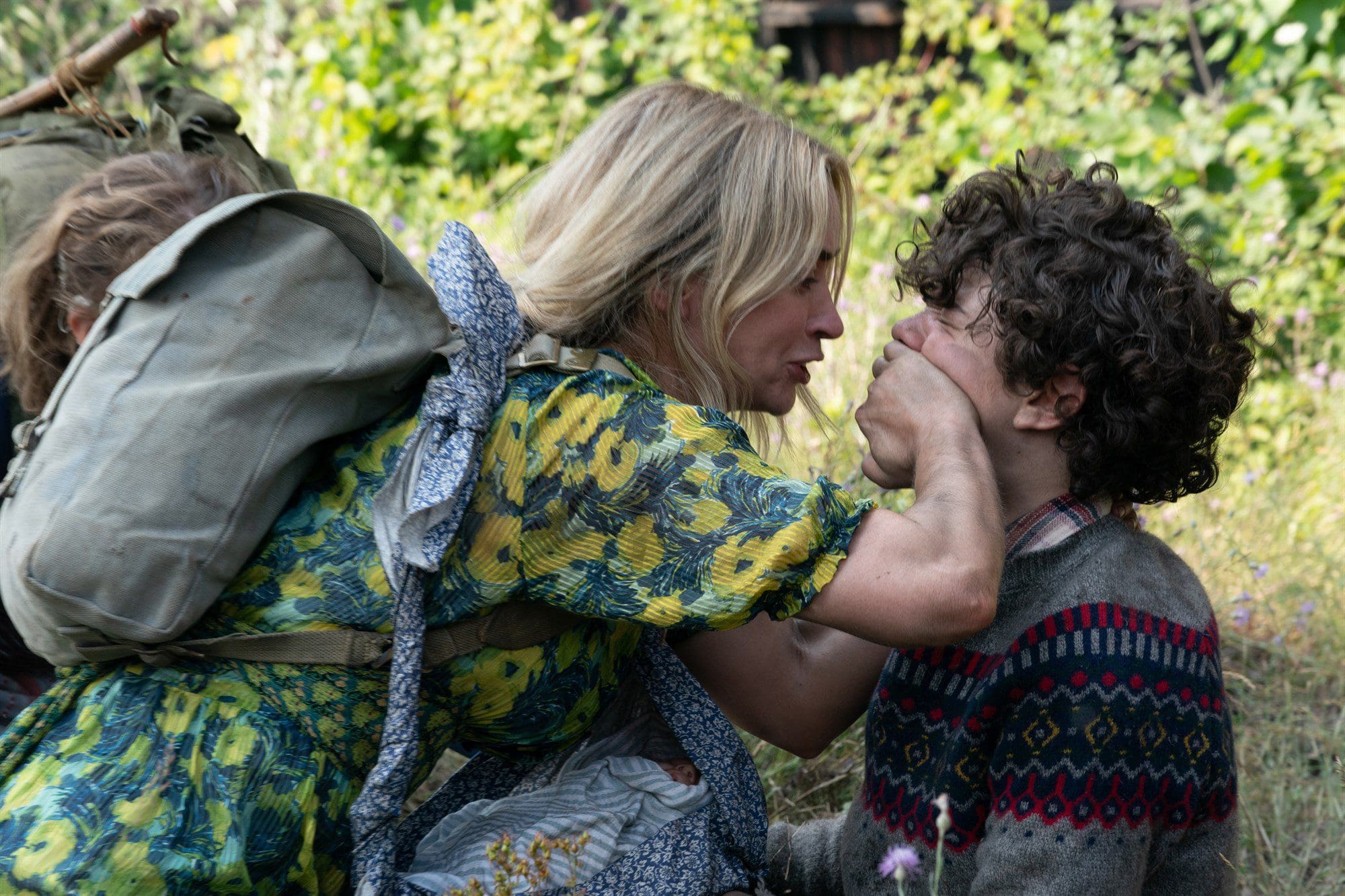
Written by Sam Niles
A Quiet Place Part II’s prologue shows the arrival of the monsters, so we get a glimpse of the Abbotts’ life before civilization ended. Because the first film conditioned the audience to be wary of any sound, the opening makes us distrustful and heartbroken. We’re distrustful because we’re one step ahead of the characters. So, as Lee (John Krasinski, also returning to write and direct the sequel) walks around a grocery store, buying snacks without a care in the world, his comfort is sharply contrasted by our unease.
Marcus’s (Noah Jupe) baseball game, for which Lee is getting snacks, provides the heartbreak. We want to root for Marcus when he’s up at bat, relish in Evelyn (Emily Blunt) pushing Beau (Dean Woodward) on a swing, and hope that Regan (Millicent Simmonds) enjoys her orange. We wish this is what their lives would be like, and the asteroid’s arrival, which dominates the sounds and silences all, destroys this wish.
This opening cements how the Abbotts survived for so long and why we root for them. They’re an ideal family without being a Ned Flanders-style parody. Their idealism doesn’t negate the potential for conflict. In fact, it can be the source of it.
Not long after we see how it started, we’re back to how it’s going. Having discovered a way to kill the aliens, Regan and Evelyn kill the last two monsters on their property. But their barn is now burning, so they have to leave. By contrasting their pre-invasion lives with the culmination of the first film, Krasinski asks: Where do we go from here?
Krasinski knows that simple, organic questions like this will fuel the drama. What’s the outside world like? How are other people surviving? What can be done with their new weapon? Because of this, A Quiet Place Part II is an organic sequel.
That last question is crucial. I was worried the means of killing the monsters would somehow be nerfed in this film to make for easier tension. “Oh no, we broke the speaker and/or your super hearing aid, guess we can’t kill the monsters anymore.” Rather, everything about the weapon is embraced, from its potential to change the world to its current limitations. There’s a tense scene where a solo Regan is using the speaker in one hand while fumbling her shotgun in another. With that scene, the film’s big, world-changing McGuffin is held back because it can’t be used with one hand.
Newcomer, Emmett (Cillian Murphy) helps answer the question, “what’s the outside world like?” Lee’s pal before the invasion, he has a friend-or-foe nature that works so well because either option is completely valid.
His first scene doesn’t show his face for much of it, instead implying his presence through the POV of a rifle’s scope. Is he using the scope as a weapon, or merely as binoculars? If he’s using it as a weapon, does he plan to shoot the Abbotts, or distract the monster chasing them? If he wanted to shoot them, does he only spare them because he saw them kill a monster, and now has something to gain?
Questions like this will race through your head any moment he’s on screen. If he’s a friend, his will be a redemption story. When he says, “the people that are left aren’t the kind of people worth saving”, he’s speaking from experience that’s made him cynical about other humans. Maybe the Abbotts will help him overcome that cynicism. If he’s a foe, he’ll be terrifying. Because that mean his claim that there are no people worth saving is projection. He’ll use the breakdown of the world as an excuse to do whatever he wants—including using a family for his own personal gain.
Krasinski’s work and Murphy’s performance work hand in hand to play the audience like a fiddle, leaving us fearful of Emmett one moment and comforted by him the next.
Emmett’s presence adds a new twist to the family dynamic, but the foundational Abbotts are as compelling as ever. There’s a moment when Marcus pleads with Regan to not go out on her own, and when their deceased father comes up, he says “and look what happened to him!” It’s a cliched line, and Krasinski knows it. We’re meant to be mad that Marcus would insult his father. Regan certainly is, until she realizes Marcus wasn’t calling their Dad stupid, just saying, “I miss Dad and I can’t lose you too.”
The Abbotts’ moral purity sounds boring when you describe it in a sentence. They all love each other and would do anything to help each other. But Krasinski and the cast understand that familial love is not always an endgame. It’s not always a relief of conflict, but is often the source of it. We hug our loved ones, but we also get upset with them, are scared for them, and would die for them.
A Quiet Place Part II continues its predecessor by finding new ways to show the Abbotts’ conviction to survive together, and it’s this conviction that warms your heart and clutches your chest with fear. You’re not just on the edge of your seat, waiting for a horrifying critter to show up, but praying, “please make it.” Whether or not Emmett ends up being a person worth saving, the Abbotts certainly are. And their place in this world, as well as their potential to save it, make for some visceral, heartfelt drama in an extraordinary sequel to an already extraordinary film.

